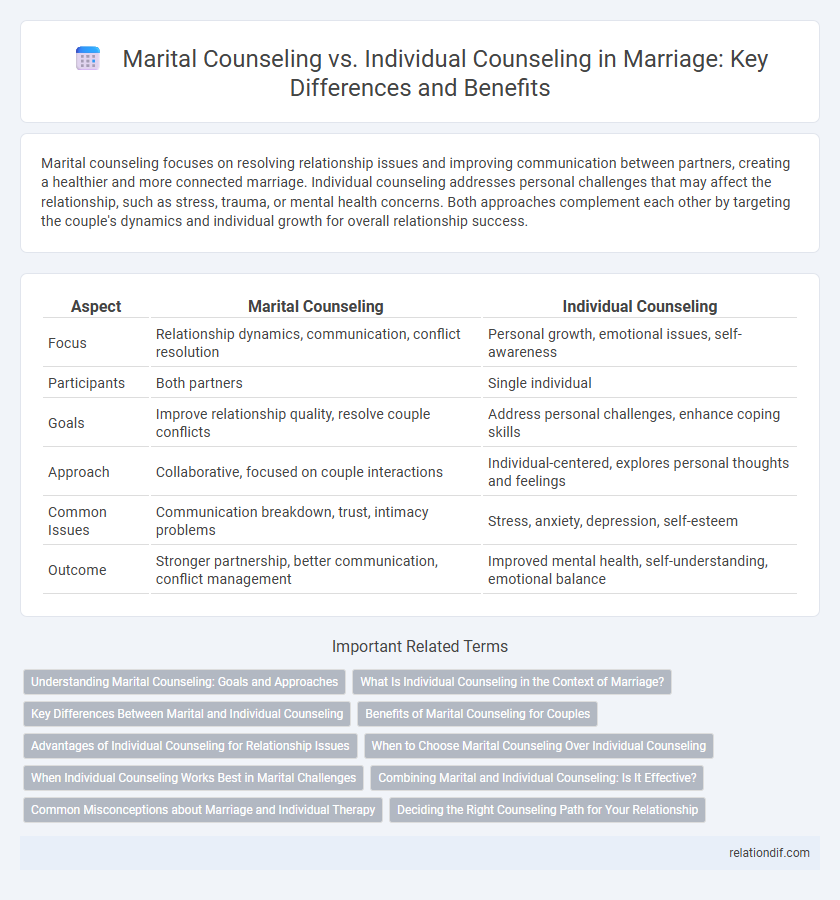Marital counseling focuses on resolving relationship issues and improving communication between partners, creating a healthier and more connected marriage. Individual counseling addresses personal challenges that may affect the relationship, such as stress, trauma, or mental health concerns. Both approaches complement each other by targeting the couple's dynamics and individual growth for overall relationship success.
Table of Comparison
| Aspect | Marital Counseling | Individual Counseling |
|---|---|---|
| Focus | Relationship dynamics, communication, conflict resolution | Personal growth, emotional issues, self-awareness |
| Participants | Both partners | Single individual |
| Goals | Improve relationship quality, resolve couple conflicts | Address personal challenges, enhance coping skills |
| Approach | Collaborative, focused on couple interactions | Individual-centered, explores personal thoughts and feelings |
| Common Issues | Communication breakdown, trust, intimacy problems | Stress, anxiety, depression, self-esteem |
| Outcome | Stronger partnership, better communication, conflict management | Improved mental health, self-understanding, emotional balance |
Understanding Marital Counseling: Goals and Approaches
Marital counseling focuses on improving communication, resolving conflicts, and strengthening the relationship between partners through joint sessions that address shared issues and dynamics. Individual counseling targets personal growth, emotional healing, and self-awareness for one partner, which can indirectly benefit the marriage by enhancing individual contributions to the relationship. The goal of marital counseling is to foster mutual understanding and cooperation, while individual counseling emphasizes individual emotional well-being and personal challenges.
What Is Individual Counseling in the Context of Marriage?
Individual counseling in the context of marriage focuses on addressing personal issues that affect the relationship, such as stress, anxiety, or unresolved trauma. It helps individuals develop self-awareness, improve communication skills, and manage emotions that impact marital dynamics. Unlike marital counseling, which involves both partners, individual counseling concentrates on personal growth to enhance overall relationship health.
Key Differences Between Marital and Individual Counseling
Marital counseling focuses on resolving conflicts and improving communication between partners, addressing relationship dynamics and shared issues such as trust, intimacy, and parenting. Individual counseling centers on personal challenges like anxiety, depression, and self-esteem, targeting the client's internal emotions and behaviors. The primary key difference lies in marital counseling's emphasis on the couple's interaction, while individual counseling concentrates on the individual's mental health and personal growth.
Benefits of Marital Counseling for Couples
Marital counseling offers couples a structured environment to improve communication, resolve conflicts, and strengthen emotional intimacy, leading to increased relationship satisfaction. Couples gain tools to navigate challenges collaboratively, enhancing trust and mutual understanding essential for long-term commitment. This focused approach promotes shared goals and fosters resilience, often leading to healthier, more fulfilling partnerships compared to individual counseling methods.
Advantages of Individual Counseling for Relationship Issues
Individual counseling offers a focused space for self-exploration and personal growth, empowering individuals to understand their patterns and emotional responses within the relationship. This approach enhances communication skills and emotional regulation, which can positively impact relational dynamics without the immediate pressure of the partner's presence. By addressing individual issues such as self-esteem, trauma, or anxiety, personal counseling lays a stronger foundation for healthier interactions and decision-making in the marriage.
When to Choose Marital Counseling Over Individual Counseling
Marital counseling is most effective when both partners face communication breakdowns, recurring conflicts, or seek to rebuild trust within the relationship, addressing issues collaboratively. Individual counseling is preferable for personal growth, managing anxiety, depression, or trauma that primarily affects one partner. Choosing marital counseling over individual therapy is crucial when the goal is to improve relational dynamics and mutual understanding rather than solely focusing on one person's mental health.
When Individual Counseling Works Best in Marital Challenges
Individual counseling works best in marital challenges when one partner needs to address personal issues such as anxiety, depression, or past trauma that affect the relationship dynamics. It allows individuals to develop self-awareness and coping strategies independently, which can improve their contributions to the marriage. This approach is especially effective when one partner is unwilling or unable to participate in joint sessions, enabling progress outside of couple therapy.
Combining Marital and Individual Counseling: Is It Effective?
Combining marital and individual counseling can enhance relationship dynamics by addressing both shared issues and personal challenges simultaneously, leading to more comprehensive healing and growth. Research in marital therapy shows that integrating individual sessions allows partners to explore personal emotions and behaviors that impact the marriage while fostering better communication during joint sessions. This dual approach is particularly effective in resolving deep-seated conflicts and increasing emotional intimacy, resulting in higher rates of long-term marital satisfaction.
Common Misconceptions about Marriage and Individual Therapy
Marital counseling focuses on resolving relationship issues between partners by improving communication, addressing conflicts, and fostering mutual understanding, whereas individual counseling centers on personal growth, emotional healing, and self-awareness. A common misconception is that marital counseling only serves couples on the brink of divorce, while individual therapy is mistakenly viewed as a sign of weakness rather than a tool for mental health. Both types of therapy provide unique benefits, with marital counseling targeting relational dynamics and individual counseling supporting personal development and emotional resilience.
Deciding the Right Counseling Path for Your Relationship
Deciding the right counseling path for your relationship depends on the specific challenges you face; marital counseling focuses on improving communication, resolving conflicts, and strengthening partnership dynamics between couples. Individual counseling addresses personal issues such as emotional regulation, self-esteem, or past trauma, which may indirectly impact the relationship. Evaluating whether your concerns are shared as a couple or rooted in individual experiences helps determine if joint or solo therapy is the most effective approach.
Marital counseling vs Individual counseling Infographic

 relationdif.com
relationdif.com